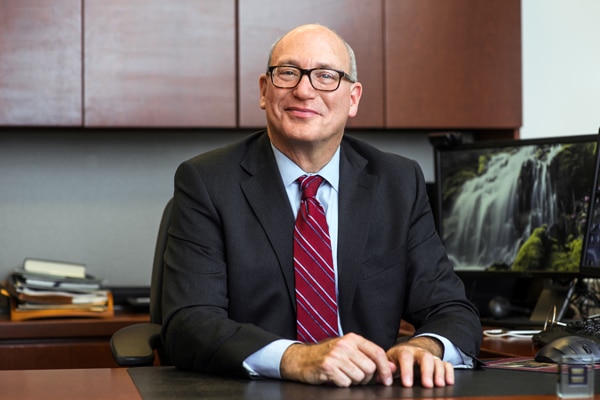
“I don’t know if you’ve ever read Siddhartha, by Hermann Hesse, but that concept of a leaf floating down the river of life, going where it’s supposed to go—I think I was always meant to be here.”
So says Michael Levine of Local Initiatives Support Corporation (LISC), a nonprofit devoted to the revitalization of underserved areas through investment and economic-development activities. Levine, who’s been with the organization for more than thirty years, describes it as being embedded in his identity.
He grew up in a culture of social justice, after all. He recalls being in seventh grade and “walking back and forth in front of supermarkets,” boycotting grapes in support of the United Farm Workers. And when he wasn’t protesting, he was volunteering. “It was always thought of in our family that we were part of a bigger picture,” he says, “and that we had an obligation to help others.”
When he went to law school, he intended to become a public-interest lawyer, but Levine says that community development “wasn’t really a field back then,” so he ended up trying litigation instead. “I was heavily influenced by To Kill a Mockingbird,” he says with a laugh. He didn’t find that litigation was for him, so he moved into real estate law for a few years before a headhunter referred him to a law firm that represented LISC. After two years as outside counsel, Levine was brought into LISC as its general counsel.
Now, more than three decades later, the company has grown from $5 million in investment per year to more than $1 billion, and Levine’s legal team has blossomed to encompass a dozen people, who do 80 percent of LISC’s legal work in-house. They’re able to do this—and contribute significantly to LISC’s funding goals while protecting its nonprofit status—despite the fact that the organization operates on a decentralized structure, with thirty-one field offices across the country, each one working intimately with the community it serves.
Maintaining close community ties is actually a core thrust for LISC. “The big difference between LISC and organizations that do similar work is our emphasis on the word local,” Levine says. “We’re on the ground. What we do is work with people in underserved neighborhoods, both urban and rural, and ask them what they need to make the neighborhood a place they want to stay.”
After those conversations, which take the form of meetings, focus groups, and surveys, LISC partners with nonprofit and for-profit organizations—as well as schools and local businesses—that are “sensitive to the needs of the neighborhood.” “This way,” Levine says, “we can fund the revitalization of neighborhoods in a way that’s consistent with local values and priorities.”
In addition to investing capital and providing technical assistance to help improve each community’s infrastructure, LISC works to bolster and support the people within the communities. One way it does this is through its network of nearly eighty Financial Opportunity Centers. At these centers, low- and moderate-income people can take advantage of credit-counseling services, basic job-skills training, and job-placement opportunities. “Neighborhood revitalization is a huge part of what we do,” Levine says, “but I think changing the economic prospects of families is going to have the longest-lasting impact.”
LISC’s growth and ambition—recent developments have included partnerships with ESPN, the NFL, and Facebook—mean that Levine’s work is as complex as it is satisfying. LISC’s decentralized structure, for example, pushes him to navigate the intricacies of different states’ laws and human resources protocols. And then there’s the breadth of LISC’s services, which has Levine routinely oscillating between issues of liability, insurance, finance, and many other arms of the law while still protecting the company’s tax-exempt status.
One of Levine’s ongoing efforts, which has contributed a great deal to the company’s overall impact, is related to the Low Income Housing Tax Credit program introduced in the Tax Reform Act of 1986. “My role then was to help figure out how to create and structure a legal entity that would allow us to syndicate the credit and not endanger our fund-raising and charitable activities,” he says. Since solving that problem, Levine adds, the core of his job has entailed “creating arms of LISC that bring this huge amount of capital into underserved neighborhoods while still operating as a tax-exempt organization.”
It’s an involved endeavor, but the work is worth it. “I feel like I’ve achieved why I went to law school—and also that I’ve honored the values of my family,” Levine says. “I will also say that I love the fact that I’m good at it. The job gives me a tremendous feeling of accomplishment from a substance perspective but also from the knowledge that I’m utilizing my abilities.”
That said, Levine does note that his personal investment can take an emotional toll. “There’s dark moments, when I see what’s going on in our country and that people just don’t understand or seem to care about how hard it is for most Americans to get through the day economically,” he says. “Part of the challenge of the job is to not lose hope.”
That’s when he thinks of all the community groups he’s encountered through his work at LISC—the residents, businesses, and churches that have planted their feet in impoverished neighborhoods and remained determined to restore them. “All my job is, is to help them achieve their dreams,” Levine says.
[Editor’s note: At press time, Michael Levine had retired from his role at LISC. He continues to work in community development via nonprofit board memberships, some volunteer work, and consulting.]


